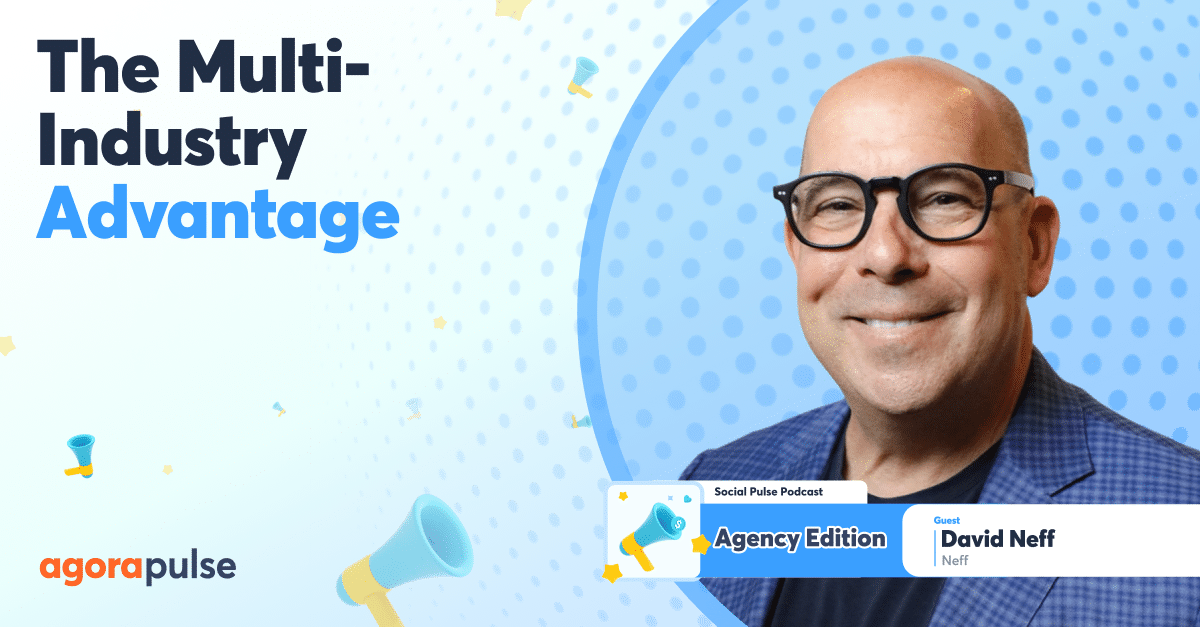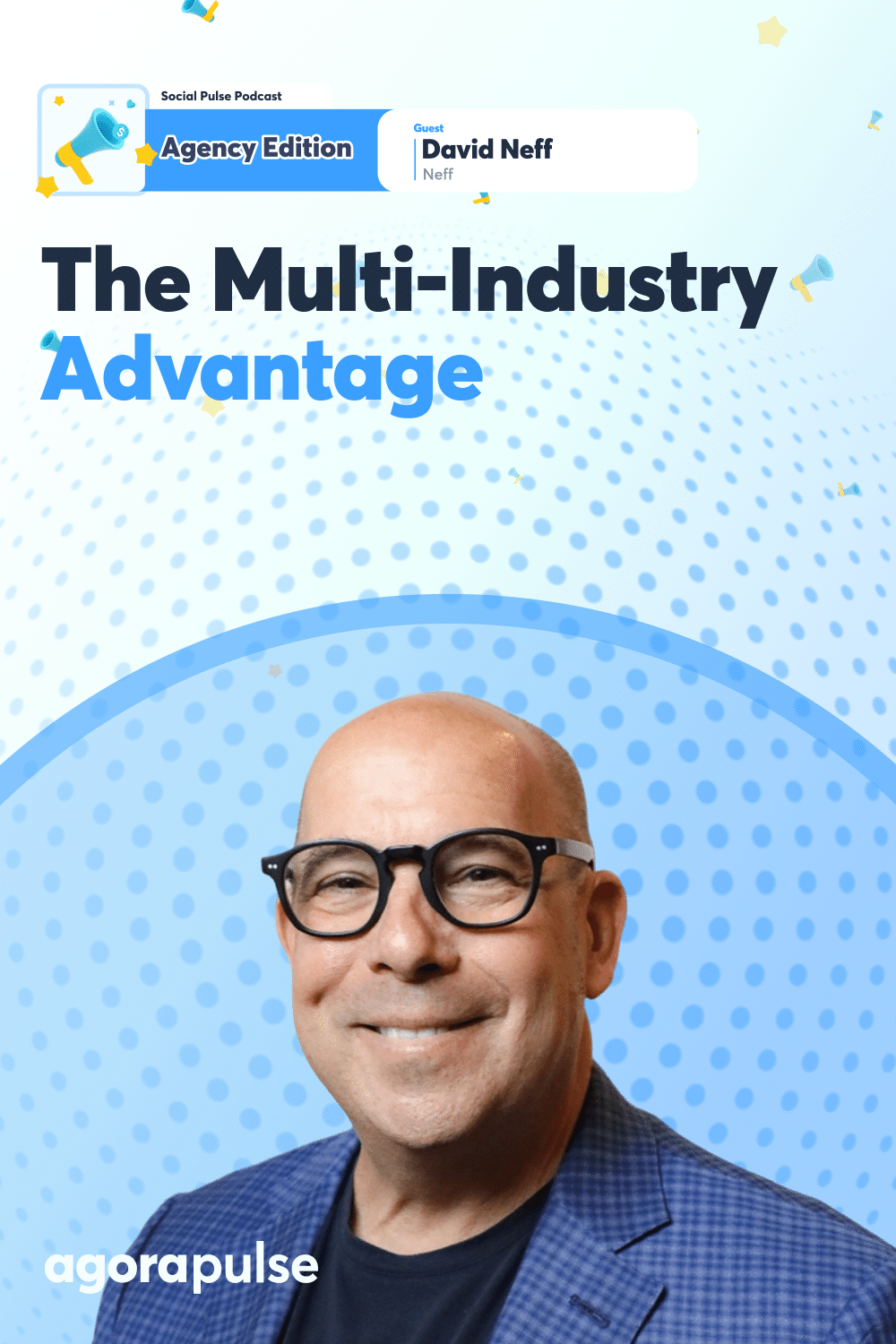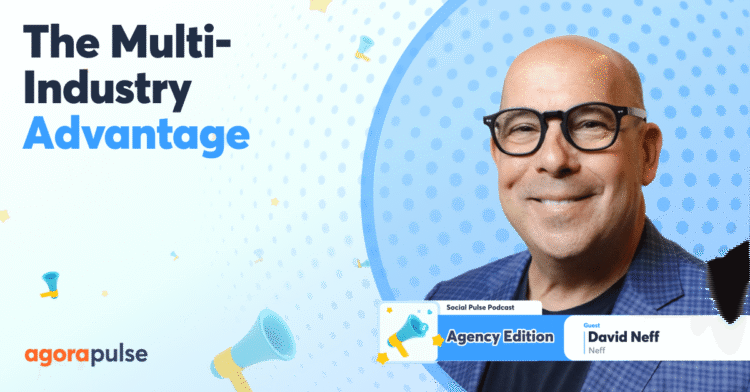Many agency owners find themselves trapped in a single industry niche, constantly fighting for the same clients and struggling to break through growth plateaus. You’ve developed expertise in one vertical, but the market is getting saturated, competition is driving down prices, and you’re vulnerable to industry-specific downturns. What if expanding into multiple industries could be the key to sustainable growth? Is diversification the answer to building a more resilient agency, or will it just dilute your focus and reputation?
Today, we’re joined by David Neff, founder and president of Neff, an award-winning full-service advertising and public relations agency. With over 35 years of experience, David has transformed his agency from a local player into a regional and national powerhouse serving the real estate, restaurant, hospitality, and retail industries. His strategic approach to expansion across multiple sectors offers a blueprint for agencies looking to scale beyond their original niche.
Social Pulse Podcast host Mike Allton asked David Neff about:
- Practical strategies for identifying and entering new industries that complement your agency’s existing strengths and expertise.
- Organizational approaches to managing multi-industry expertise without diluting your brand or overwhelming your team.
- How to leverage cross-industry knowledge to create unique competitive advantages and deliver superior client outcomes.
Learn more about David Neff
Resources & Brands mentioned in this episode

Full Transcript
(lightly edited)
I’d love it if you could just start by sharing your origin story of the agency and what industry you initially focused on before expanding.
David Neff: Great question, Mike. The initial industry that Neff started in was telecommunications in the mid-eighties.
When we started, I was director of marketing for a national reseller of AT&T, and at that company, I was able to grow their customer base by about 300% in nine months. So at the time, I had the world to gain. I had nothing to lose. And I had a couple of clients solicit me. Knowing that I was the guy behind the rapid growth of this telecommunications company, they solicited me to submit proposals to them for a marketing campaign, similar to what I had done for the company that I was employed by.
And I submitted the proposals. We were hired for several of those client opportunities, and lo and behold, I was in the agency business on my own. I had planned on pairing the telecommunications experience back into a larger agency, but that never happened because of the opportunity that I stumbled upon.
What were some of the first signs that told you that expanding beyond telecoms would be beneficial to your growth?
David Neff: Mike, I would love to tell you that I was so strategic in diversifying, but it all happened for selfish reasons when I stepped back. I said, you know what I like, telecommunications. I know telecommunications, but I would like to go after some more interesting accounts like hospitality and retail and food, and real estate.
So those were industries that I just thought would be a lot of fun to work on, and I was very much fascinated and enamored with those industries. Started targeting some prospects, advertising agency prospects in those industries. And we were, we were hired, and as you well know, in advertising, once you get an account or two in a specific category and you’re successful, then it makes it much easier to garner more business in that specific vertical market.
Mike Allton: Yeah, that’s a hundred percent true. You’ve got that experience, that street cred, maybe some case studies make it all the easier.
Was there any specific criteria used to evaluate the potential of those industries?
David Neff: Again, I would love for you to think and others that I had this grand strategy and plan, but a lot of it all happened organically, and we did a good job for the clients that we were hired by. But a lot of it was being in the right place at the right time. As I always do, I use the expression I’d rather be lucky than good.
So luck has been on my side and continues to be on my side. But a lot of people will tell you only that the people who work hardest are the luckiest.
Mike Allton: A hundred percent true. That’s so right now I’m thinking about how, obviously, you’re starting in each one of these new niches, and we already mentioned, yeah.
The importance of bringing on some new clients so that you can demonstrate value and experience, and that sort of thing.
Were there any other challenges that you were facing as you went into these unfamiliar industries, and how else did you try to overcome that credibility gap?
David Neff: The best way to build credibility is to have expertise in the areas. Of the services that you’re offering. So to me, quite frankly, the principles of being good, of being effective in marketing and communications and public relations and advertising and media buying, the fundamentals are all the same. If you apply those fundamental principles and experience to new business segments, it becomes much easier for me, and it’s not intimidating.
I think maybe some people might get intimidated. Healthcare, I don’t have a lot of experience in healthcare, so I’m not going to talk to a company in that segment because of a lack of experience. But the bottom line is, if you’re a good publicist and you’re strategic and you’re smart in your approach, and you know how to develop relationships with people in the media, for example, those principles hold in all media, regardless of segment or industry-specific expertise, the same holds for advertising. Whether it be digital advertising, whether it be traditional advertising. If you know how to negotiate and you know how to plan a good strategic media buy and plan, I think you’re going to be successful.
It’s the same principles, but one is also an underlying principle, and one underlying principle we’ve always held to is that we as an agency are not going to be taken seriously in any business segment unless we are producing award-winning, beautiful, most importantly, results-driven work. So it’s the quality of the strategic plan, and it’s the quality and integrity of the design and the creative.
That really will help you win business, gain credibility, and help you grow your agency.
So, as you were growing your agency, not just in terms of clients, but also in terms of staff. Did this difference in industry affect how you were structuring your agency? Were you cross-training staff or having specialized teams or anything like that?
David Neff: Not really. What I had just shared with you is pretty consistent with the experience that your younger colleagues have when you’re building a team, they’re gaining experience. As well as in specific areas, and understanding whether it’s public relations or social media, or whether it’s advertising and media buying, or creating a new brand.
The team gains experience, expertise in the disciplines that they’re applying to their work day in and day out, and they in turn become. Less intimidated by a new vertical market that maybe we, or they, have less experience in.
Mike Allton: That makes complete sense. I’ve seen the same thing in content marketing. If I’m going to create an asset on, the best social media marketing strategies or something like that. It’s fairly easy to adapt that into different verticals, ’cause the core principles are the same.
David, I mentioned, at least in my experience, this is a bit of a counterintuitive idea. People are always telling me that the riches are in the niches, or however you pronounce it. Niche. I know many agency owners, and they might worry about diluting their expertise or their brand when they diversify.
How have you maintained this strong value prop across all these different industries?
David Neff: Mike, a lot of it is just being selfish. I personally would be bored beyond belief if I were, for example, just handling technology accounts, just handling automotive accounts, or food accounts, or real estate accounts.
So selfishly, I personally and professionally love the diversity of clients. So again, no day is the same. We have been fortunate enough to develop solid reputations and results for many different clients in a multitude of specialized segments.
Mike Allton: Love it. Now, a moment ago, you were talking about how. Expertise in one industry often applies to basically every industry, with some core principles. Yeah.
I’m wondering if you could share a story, though, where the knowledge from a specific industry created unexpected value or innovation for clients in a different industry. Does anything like that come to mind?
David Neff: Sure. I guess I could use public relations and publicity as an example. When we first started, I had developed a great relationship with someone at the Philadelphia Inquirer whose beat was telecommunications. Telecommunications was very volatile at the time because Judge Green made a ruling that AT&T was required to divest itself, which is what brought in many different companies to compete in the various segments of telecommunications.
So I developed a relationship with the key telecommunications writer at the Philadelphia Enquirer, and that relationship afforded the organization that I was working for to constantly be quoted in feature stories on the volatility of the industry. So it’s all, so I realized very early on, it’s all about relationships.
Always preaching to my team, you’re not going to garner publicity by just doing this. Yeah. Or doing this. You garner more publicity for your clients by doing this. And by having in-person meetings. So those principles still hold to this day. So I had this, going back literally two weeks ago, developed a relationship with a brand that we helped launch in Philadelphia.
The name of the brand is GoPuff. So GoPuff is across the United States of America, and they’re also in the UK. They will deliver anything that you would buy at a convenience store or a grocery store within half an hour, and they only charge $3. So I have helped launch them. They started a delivery service of alcohol, which they named GoBeer, and lo and behold, I guess the founders of the company were talking about a new partnership with Starbucks and they, out of the blue, called me again. Relationships with clients, too, are very important, and we learned about the partnership they have with Starbucks and how important it was and how much it said about GoPuff. Basically Starbucks by partnering with GoPuff, Starbucks was saying to them, no one has perfected quick delivery where our drinks and food can be delivered with integrity in a very short window of time like you GoPuff. So they tested a program, and they then hired us to get the word out that this plan is now permanent, and this plan had an increased geographic footprint.
Mike Allton: I love that story, and I love this point. I couldn’t agree more about the importance of relationships. I had an entire podcast all about partnerships and relationships ’cause they were just so important. Every business.
As you’ve gone through this journey, are there any mistakes that you’ve made that you think other agency owners should avoid?
David Neff: This show’s not long enough, Mike, to tell you how many mistakes I’ve made. I’m continuing to make mistakes day in and day out. Yeah, every day is a learning experience. I learned something new every day.
More recently, there was a new piece of business that we were competing for, and we did not get the business. I’m pretty sure we came in second place, but it doesn’t matter whether you come in 10th place or second place. We did not win the account. It was an important account, and I regretted not lowering my fee structure in my proposal at the 11th hour when I already knew that I was a finalist.
I do believe I did lower it a little, but I don’t believe I lowered it enough, and I beat myself up over that. Fortunately, they have reemerged with a new need. It’s yet to be determined whether they’re going to retain Neff. But fingers crossed, they will. So then I, maybe then I’ll have less of a regret about how it was handled.
But I make mistakes all the time. And my team makes mistakes all the time. And when you make a mistake, just recognize, don’t beat yourself up over the mistake, or don’t beat your people up over making the mistake. I bring these things up so they can be learning experiences for all of us, so hopefully smart people don’t make the same mistake multiple times, although I’m probably guilty of that too.
Mike Allton: I’m sure we all are, but still, I think that’s a fabulous reminder to everybody listening.
Are there any resources or learning approaches that you’d recommend for agency owners that they want to expand their industry expertise?
David Neff: I have been a member over the years of different peer groups, so I think that’s always a helpful exercise to join some sort of peer group. Whereby there are other agency owners in similar situations with a similar size to whatever size your agency is, you know that you can have ongoing, regularly scheduled meetings, whether they be once a month or they’re probably Zoom calls or maybe the group.
I was a member for a while. We would meet one time a year in person. Those can be helpful experiences. I would say something that would also be very helpful, which is something I regretfully never did, was having a mentor or mentors.
Mike Allton: Yes, that is fabulous advice. I love mastermind groups. I think I still have a little bit of a free course. I’ll look for it. Put in the show notes. For folks who’ve never been in a mastermind group, and we’re not talking about the kind of mastermind group that you pay to be in, isn’t that? Find some peers and colleagues informally. You get on a call once a week, once a month. And you share, and there are certain structures that you want to adhere to make sure that it’s valuable to everybody. So I’ll look for that and I’ll put a link in the show notes. David, this has been fascinating. I want to thank you for your time for sharing your insights.
If anyone wants to reach out and connect, where should they go?
David Neff: I’m happy to talk to anyone. My email address is dn@neffknows.com.
Mike Allton: Fantastic. Thanks, David. Thanks to all of you for listening. Of course. We’ll have all the links. In the show notes below, but that’s all the time we’ve got for today.
Friends, don’t forget to find the Social Pulse Podcast Agency edition on Apple. Drop me a review. Let me know what you thought of this episode and what you’d like us to cover in the future.
Until next time!















